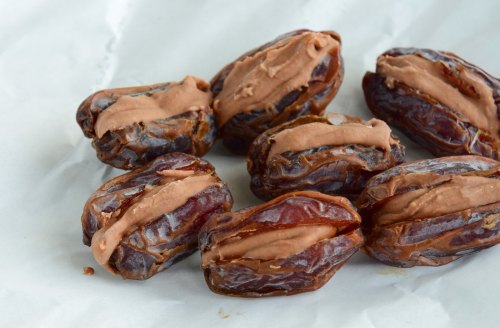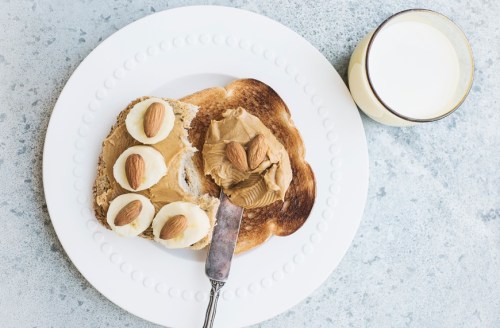In recent years, almond butter was somehow anointed the chosen nut butter among health-conscious eaters, who smear it on their sprouted breads and gaze upon peanut butter as its low-brow relative. But the creamy almond treat is not cheap (it’s often about double the price of peanut), and when pressed, most people really can’t tell you why they’re willing to splurge.
So in search of a definitive answer, we asked top nutritionists and health coaches to really break down the health differences between the two nut butters we’re obsessed with most. Which is better for you—almond or peanut? Welcome to the nut butter battle…
Scroll down to see which nut butter is healthier: almond or peanut.

Macronutrients
When it comes to the big guys—carbs, protein, and fat—almond and peanut butter are like fraternal twins. “You can see a gram difference here or there, but it doesn’t really make a difference,” says Pure Nutrition founder Christian Henderson, MS, RD. A single two-tablespoon serving of either is high in calories (200) but comes with lots of protein (about 7g) and healthy fats.
Some nutritionists and health coaches point to almond’s slightly higher concentration of good fats, but the difference is nominal. “Almonds have a little bit less saturated fat, but I feel a little bit silly saying that, since they’re so close,” says SPE Certified’s senior culinary nutritionist Natalia Hancock, RD.
Micronutrients
Within the nitty gritty nutrients is where a difference starts to emerge between the butters.
“Almond is better for vitamin E and magnesium, which are two very important micronutrients,” Henderson explains. “Vitamin E is an antioxidant and magnesium is important for bone health and your central nervous system.” This is especially powerful since vitamin E is not found in a wide variety of foods.
Almond butter also has more calcium and iron than peanut.
Natural and organic
No matter which nut butter you’re choosing, looking out for added sugar and preservatives is a must; ingredient lists should include little more than plain old nuts. You can satisfy this requirement with either butter, but “when you go shopping for almond butter, it’s almost all natural brands, you don’t see the Jiffy,” says health coach and Sakara Life founder Danielle DuBoise. “It’s just easier to choose a natural, no-added-sugar, no-preservatives almond butter.”
And when it comes to organic, you have to be more careful with peanuts, says Henderson. “Peanuts are just one of those crops like soybeans and corn that are so overgrown and over-processed in America. They’re hard to grow, so many pesticides are often used on peanuts,” she says. “If the peanut butter is not organic, you don’t want to be anywhere near it.

Other factors
Aside for nutrition facts, there are a few other factors experts consider. Peanuts crops are susceptible to fungi called aflatoxins, which are associated with an array of diseases. The FDA does regulate the presence of aflatoxins, but some say you can’t be too careful. “I worry about that, so I just err on the side of caution,” DuBoise reasons.
Henderson also says that she’s noticed from observations in her practice that almond butter has worked better for her clients struggling with weight loss. “Peanuts just tend to be more addictive for people; almonds tend to be more filling.” Peanuts also may cause more bloating, since they’re technically legumes, not nuts.
Taste and uses
Of course, since both butters can be part of a healthy diet, a lot of decisions come down to which just works better, for your taste buds or whatever you’re whipping up in the kitchen. “They each have their own place,” says Hancock, who works with top chefs to create flavorful, healthy meals around the country. “I think peanut butter tastes better with bananas and almond tastes better with apples.”
And while almond butter works really well in smoothies, peanut butter does tend to have more culinary uses, she says. “I’ll use peanut butter in a stir fry, Thai style, and I do a really great African spicy sweet potato soup with peanut butter in it that’s really delicious.”
Originally posted October 4, 2013; updated August 28, 2018.
More of a chocolate person? Get 35 healthy ways to get your chocolate fix and get tips on how to build a healthy snack stash.
Sign Up for Our Daily Newsletter
Get all the latest in wellness, trends, food, fitness, beauty, and more delivered right to your inbox.
Got it, you've been added to our email list.









